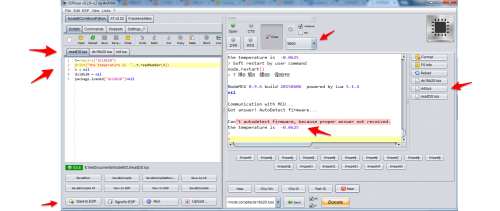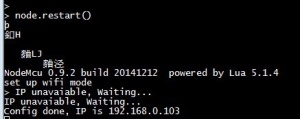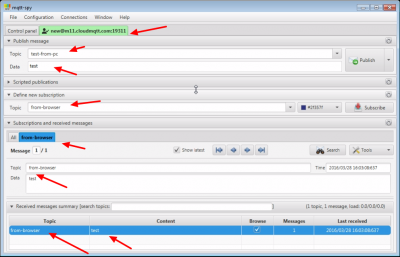ESP8266 NodeMCU Code
Examples and Demo
- using IDE esplorer can easily manage and program the ESP8266 board
- Here we only try and make sure the code can be compiled well, ds18b20 is not connected.
- Use "upload" to upload code is better for avoiding errors
DS18B20 Read Temperature (simplified codes)
- ds18b20.lua shorten code, this will be used as a lua module
--
-- DS18B20 one wire module for NODEMCU
-- LICENCE: http://opensource.org/licenses/MIT
-- Vowstar <vowstar@nodemcu.com>
-- Dramatic simplification: Peter Scargill
--
-- Set module name as parameter of require
local modname = ...
local M = {}
_G[modname] = M
--
-- Local used modules
--
-- Table module
local table = table
-- String module
local string = string
-- One wire module
local ow = ow
-- Timer module
local tmr = tmr
-- Limited to local environment
setfenv(1,M)
----
-- Implementation – you don’t get any shorter than this
----
function readNumber(pin)
ow.setup(pin)
ow.reset(pin)
ow.write(pin, 0xCC, 1)
ow.write(pin, 0xBE, 1)
data = nil
data = ""
for i = 1, 2 do
data = data .. string.char(ow.read(pin))
end
t = (data:byte(1) + data:byte(2) * 256) / 16
if (t>100) then
t=t-4096
end
ow.reset(pin)
ow.write(pin,0xcc,1)
ow.write(pin, 0x44,1)
return t
end
-- Return module table
return M
- Main code file readDS.lua, will use module ds18b20
t=require("ds18b20")
print("the temperature is "..t.readNumber(4))
t = nil
ds18b20 = nil
package.loaded["ds18b20"]=nil
- Init.lua entry, setup wifi and dofile readDS.lua
print(wifi.sta.getip())
wifi.setmode(wifi.STATION)
wifi.sta.config("apname","password")
print(wifi.sta.getip())
dofile('readDS.lua')
HTTP Client
- simple HTTP client
-- A simple http client
conn=net.createConnection(net.TCP, false)
conn:on("receive", function(conn, pl) print(pl) end)
conn:connect(80,"121.41.33.127")
conn:send("GET / HTTP/1.1\r\nHost: www.nodemcu.com\r\n"
.."Connection: keep-alive\r\nAccept: */*\r\n\r\n")
More simple HTTP client
-- a simple http server
srv=net.createServer(net.TCP)
srv:listen(80,function(conn)
conn:on("receive",function(conn,payload)
print(payload)
conn:send("<h1> Hello, NodeMcu.</h1>")
end)
end)
PWM operation
function led(r,g,b)
pwm.setduty(1,r)
pwm.setduty(2,g)
pwm.setduty(3,b)
end
pwm.setup(1,500,512)
pwm.setup(2,500,512)
pwm.setup(3,500,512)
pwm.start(1)
pwm.start(2)
pwm.start(3)
led(512,0,0) -- red
led(0,0,512) -- blue
Blink LED
lighton=0
tmr.alarm(0,1000,1,function()
if lighton==0 then
lighton=1
led(512,512,512)
-- 512/1024, 50% duty cycle
else
lighton=0
led(0,0,0)
end
end)
repeat using timer
tmr.alarm(1,5000,1,function() print("alarm 1") end)
tmr.alarm(0,1000,1,function() print("alarm 0") end)
tmr.alarm(2,2000,1,function() print("alarm 2") end)
-- after sometime
tmr.stop(0)
Telnet server
-- a simple telnet server
s=net.createServer(net.TCP,180)
s:listen(2323,function(c)
function s_output(str)
if(c~=nil)
then c:send(str)
end
end
node.output(s_output, 0)
-- re-direct output to function s_ouput.
c:on("receive",function(c,l)
node.input(l)
--like pcall(loadstring(l)), support multiple separate lines
end)
c:on("disconnection",function(c)
node.output(nil)
--unregist redirect output function, output goes to serial
end)
print("Welcome to NodeMcu world.")
end)
Read ds18b20
-- read temperature with DS18B20
t=require("ds18b20")
t.setup(9)
addrs=t.addrs()
-- Total DS18B20 numbers, assume it is 2
print(table.getn(addrs))
-- The first DS18B20
print(t.read(addrs[1],t.C))
print(t.read(addrs[1],t.F))
print(t.read(addrs[1],t.K))
-- The second DS18B20
print(t.read(addrs[2],t.C))
print(t.read(addrs[2],t.F))
print(t.read(addrs[2],t.K))
-- Just read
print(t.read())
-- Just read as centigrade
print(t.read(nil,t.C))
-- Don't forget to release it after use
t = nil
ds18b20 = nil
package.loaded["ds18b20"]=nil
- List the code files inside of the board
--list.lua
l = file.list();
for k,v in pairs(l) do
print("name:"..k..", size:"..v)
end
--init.lua will be excuted file.open("init.lua","w") file.writeline(print("Hello World!")) file.close() node.restart() -- this will restart the module.
Basic Init for wifi setup
- Connect wifi
print(wifi.sta.getip())
--nil
wifi.setmode(wifi.STATION)
wifi.sta.config("SSID","password")
print(wifi.sta.getip())
--192.168.18.110
- default init lua, connect to wifi, retrieve IP and then dofile
- init file
--init.lua
print("set up wifi mode")
wifi.setmode(wifi.STATION)
wifi.sta.config("SSID","PassWord")
--here SSID and PassWord should be modified according your wireless router
wifi.sta.connect()
tmr.alarm(1, 1000, 1, function()
if wifi.sta.getip()== nil then
print("IP unavaiable, Waiting...")
else
tmr.stop(1)
print("Config done, IP is "..wifi.sta.getip())
--dofile("yourfile.lua")
end
end)
GPIO control
pin = 1
gpio.mode(pin, gpio.OUTPUT)
gpio.write(pin, gpio.HIGH)
gpio.mode(pin, gpio.INPUT)
print(gpio.read(pin))
- Blink LED or relay
pin = 6
lighton=0
gpio.mode(pin,gpio.OUTPUT)
tmr.alarm(1, 1000, 1, function()
if lighton==0 then
lighton=1
gpio.write(pin,gpio.HIGH)
else
lighton=0
gpio.write(pin,gpio.LOW)
end
end)
File operation
- Read config from config.tx
--MQTT, server, user, password, port
file.open("config.txt", "r")
MQTTs = file.readline()
print("server:"..MQTTs)
--MQTTs = "m11.cloudmqtt.com"
MQTTu = file.readline()
MQTTp = file.readline()
MQTTpo = file.readline()
file.close()
print("server:"..MQTTs)
- the config should represent:
m = net.createConnection(net.TCP, 0)
print("user:"..MQTTu)
m = mqtt.Client(MQTTu, 120, MQTTu, MQTTp)
m:connect(MQTTs, MQTTpo, 0, function(conn)
print("connected")
m:subscribe("/android/",0, function(conn)
print("subscribed")
end)
end)
Smartconfig
wifi.setmode(wifi.STATION)
wifi.startsmart(0,
function(ssid, password)
print(string.format(“Success. SSID:%s ; PASSWORD:%s”, ssid, password))
end
)
MQTT
- Client ID can be anything you like, for example Nodemcu_ID1234
- Topic and message is a pair, each topic can have its own message, only the client who subscribe to this topic can receive the message
- You can find the MQTT SPY demo test tool here.
- See how it works below
Demo Code
- Note to change client_id, username, password, hostname and port below
-- initiate the mqtt client and set keepalive timer to 120sec
mqtt = mqtt.Client("client_id", 120, "username", "password")
mqtt:on("connect", function(con) print ("connected") end)
mqtt:on("offline", function(con) print ("offline") end)
-- on receive message
mqtt:on("message", function(conn, topic, data)
print(topic .. ":" )
if data ~= nil then
print(data)
end
end)
mqtt:connect("hostname", port, 0, function(conn)
print("connected")
-- subscribe topic with qos = 0
mqtt:subscribe("my_topic",0, function(conn)
-- publish a message with data = my_message, QoS = 0, retain = 0
mqtt:publish("my_topic","my_message",0,0, function(conn)
print("sent")
end)
end)
end)




